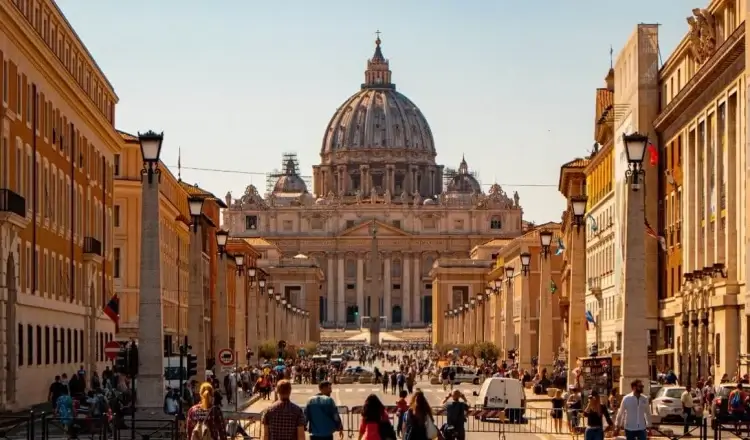Vatican City is one of the world’s most unique and mysterious countries. But how independent is it really? In this blog post, we will explore the history and status of Vatican City and its relationship with Rome. We will also discuss the many private tours of the city and suggest a few places to book private Colosseum tours in Rome. By the end of this post, you will have a better understanding of the independence of Vatican City and how to explore the mysterious city.
Table of Contents
History and Status of the Vatican City
The Vatican City is a country that resides within the city-state of Rome – an independent country with its own government, postal system, currency, and legal system. Although Vatican City has been independent since 1929, it is still subject to the laws and regulations of Italy in many respects. For example, Vatican City must pay taxes to Italy even though it is technically an independent nation. The main reason for its independence has more to do with symbolism than actual reality. Uncover the independence of the Rome Vatican City and find out how to explore this mysterious city with our informative guide and book private Colosseum tours in Rome now!
Vatican City covers an area of about 440 acres and is populated by about 1,000 citizens. It has its own government, postal system, currency (the Italian lira), and legal system. The pope is the ruler of Vatican City and has the power to appoint and dismiss ministers. The Vatican City is also a member of the United Nations, which recognizes it as an independent state. Although independence has been conferred on the Vatican City since 1929, it is still subject to many laws and regulations that apply to all cities within Rome – such as having to pay taxes even though it’s technically an independent nation.
One of the most impressive aspects of life in Vatican City is its art treasures – including some of the world’s most impressive architecture and religious artifacts. The headquarters of both the Roman Catholic Church and the Pope resides in this small country within a city-state – making it one of history’s most enigmatic places!
Evaluating the Independence of the Vatican City State
As the world’s oldest and most influential Christian church, the Vatican has played a significant role in global politics and religious affairs for centuries. However, the Vatican City State – also known as the Holy See – is unique in a number of ways. For one, it is considered a country despite its unique status as an ecclesiastical jurisdiction. Additionally, the constitution of the Vatican City State specifies the number of laws that govern its independence and jurisdiction. These laws differ from those of other countries in terms of how they operate and are run.
The sovereign nature of the Vatican City State is also important to note. This means that the Holy See has its own set of laws that govern its internal affairs, separate from those that apply to Italy or Rome. This allows for greater discretion when it comes to making decisions on matters like taxation or diplomatic relations.
The influence that Vatican City has around the world is evident not just in its political power but also in its religious stature. It is home to some of Christianity’s most iconic sites, such as St Peter’s Basilica and the Sistine Chapel. Finally, given all these factors, it is essential to understand how the Vatican City State operates if you’re interested in understanding Christian politics or international relations more generally.
Private Tours in Vatican City
If you’re looking for a unique travel experience, look no further than Vatican City. Located between two independent countries – the Vatican City State and Italy – this tiny country has an immense history and art to explore. With its dual sovereignty status, Vatican City is considered an enclave of Rome, Italy.
Not only do private tours give you access to restricted areas of the Vatican City State, but they also provide you with knowledgeable guides who can answer all your questions about the history and art of the Vatican. Some popular sites that visitors can enjoy on private tours include St. Peter’s Basilica, Sistine Chapel, and the Vatican Museums. Tours are also available for those interested in learning about Catholicism or gaining a deeper understanding of Catholicism’s relationship with other religions.
Book Private Colosseum Tours in Rome
Many different companies offer private tours of the Colosseum, so it’s important to do your research in order to find one that fits your needs perfectly. Some popular services offered through private Colosseum tours include audio commentary, transportation from and back to your hotel, lunch (if chosen), and souvenirs (such as postcards or statues).
To experience everything that a private tour has to offer, ensure that you book one with detailed itineraries and plenty of time for photo opportunities. Not only will this give you an amazing memory from your visit to Rome, but it will also help make sure that all your questions are answered during your visit. Remember – nothing beats experiencing history firsthand!
Conclusion
This article in the Cfestation must have given you a clear idea about Vatican City being an independent country with its own government, postal system, currency, and legal system. Despite its independence in 1929, it is still subject to the laws and regulations of Italy in many respects. It is home to some of Christianity’s most iconic sites, making it a unique place for visitors to explore. Private tours are available, offering exclusive access to restricted areas and knowledgeable guides who can answer all your questions about the history and art of the Vatican. Finally, private Colosseum tours offer a unique insight into Rome’s political status today as well as its rich history.




